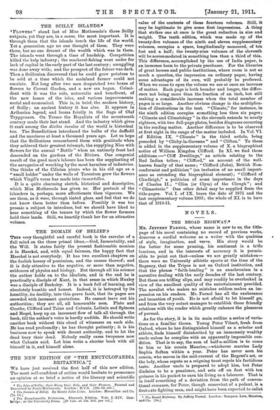THE SCILLY ISLANDS.*
'FLOWERS" stand last of Miss Mothersole's three Scilly subjects, yet they are, in a sense, the most important. It is through them that the islands touch the life of the world. Yet a generation ago no one thought of them. They were there, but no one dreamt of the wealth which was in them. 'The islands went through a time of hardship. Competition killed the kelp industry ; the mackerel-fishing went under for lack of capital in the early part of the last century; smuggling was done away with; and the prospect of the future was dark. Then a Scillonian discovered that he could grow potatoes to be sold at a time which the mainland farmer could not .emulate. Not long after two men despatched two boxes of flowers to Covent Garden, and a new era began. Coinci- dent with it was the rule, autocratic and beneficent, of the new lessee of the isles, and various improvements social and economical. This is, in brief, the modern history, of Scilly; an ancient history it has also. It appears in Arthurian legend, and looms faintly in the Saga, of Olaf Tryggvason. On Tresco the Royalists of the seventeenth century made their last stand. And the industry which gives it rank among the &vitas inaulcte of the world is historical too. The Benedictines introduced the bulbs of the daffodil .and the narcissus at least a thousand years ago. Let us hope that the Scillonians remembered them with gratitude when they achieved their greatest triumph, the supplying Nice with flowers for the annual " Battle " when an untimely frost had descended on the gardens of the Riviera. One congenial result of the good men's labours has been the supplanting of the savageries of wrecking by the most harmless of industries. one thinks of the Cilician pirate who in his old age as a "small holder " under the walls of Tarentum grew the flowers which Virgil's verse has made into immortelles.
It is a quite charming sketch, historical and descriptive, -which Miss Mothersole has given us. Her portrait of the islanders is, perhaps, more affectionate than vigorous. We see them, as it were, through tinted glass, and feel that we do not know them better than before. Possibly it was too prosaic a subject to introduce, but we should have liked to hear something of the tenure by which the flower farmers hold their lands. Still, we heartily thank her for an attractive volume.










































 Previous page
Previous page